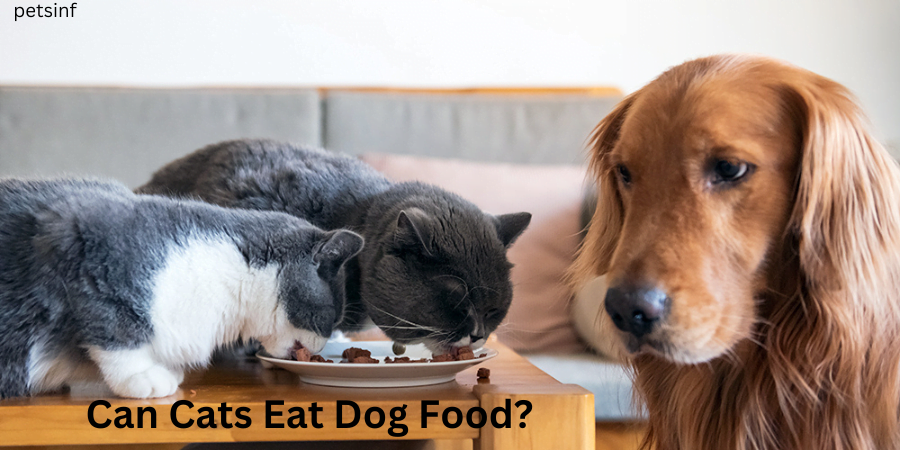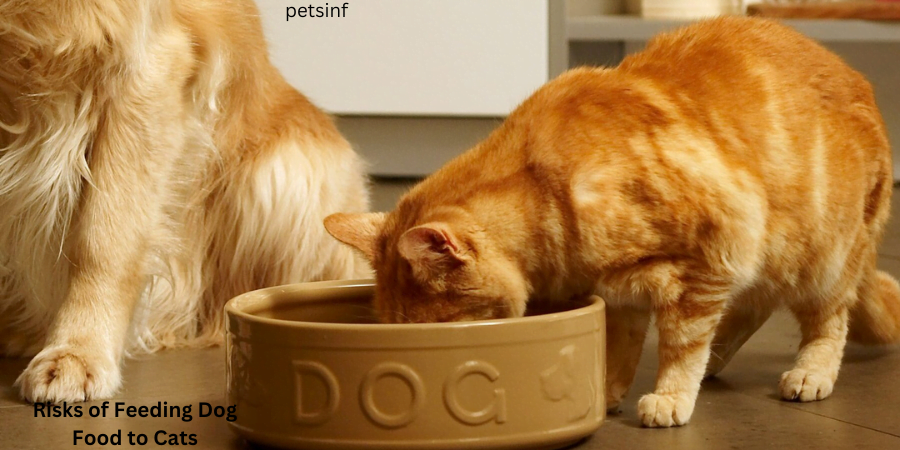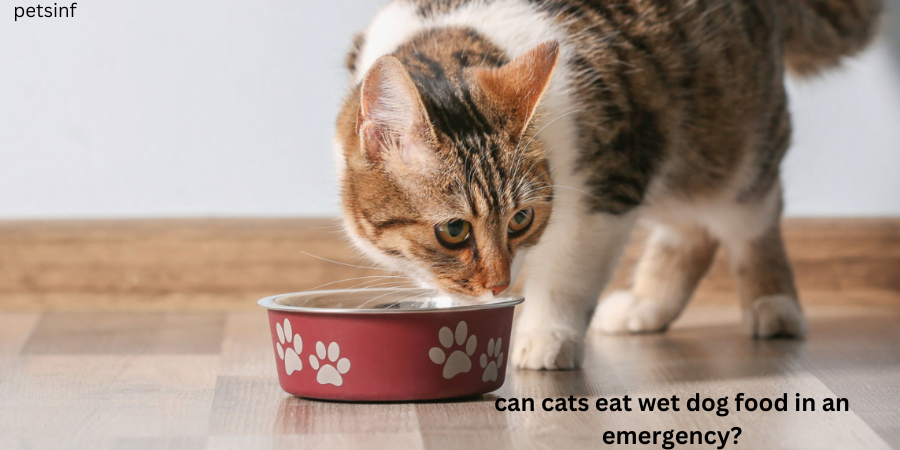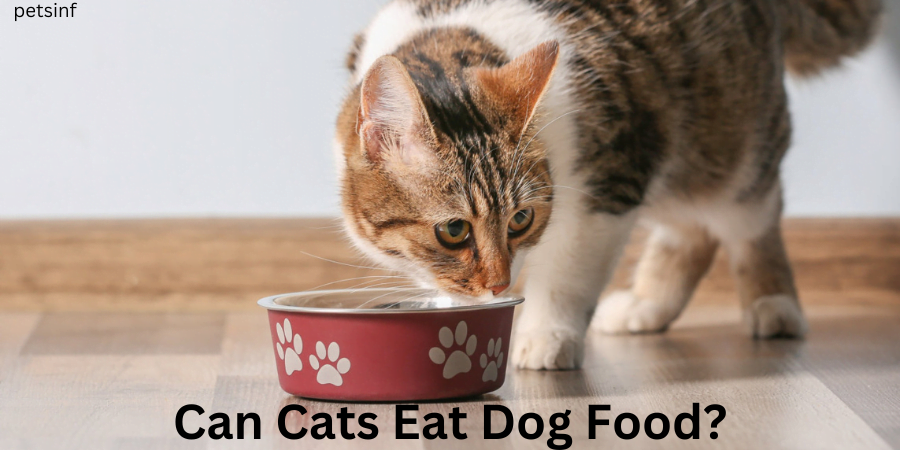
Introduction:
When it comes to our feline friends, Can Cats Eat Dog Food? Their health and nutrition are of utmost importance. Many pet owners wonder if cats can indulge in dog food occasionally or if it poses risks to their well-being. In this comprehensive guide, we will explore the ins and outs of whether cats can eat dog food, backed by expert insights and scientific facts.
Table of Contents
Understanding the Nutritional Needs of Cats
- Before delving into the question, it’s essential to grasp the specific nutritional requirements of cats.
- Cats are obligate carnivores, meaning their diet primarily consists of meat.
- They need nutrients like taurine, arachidonic acid, and vitamin A, which are crucial for their overall health.
The Composition of Dog Food
Protein Content:
- Cats require higher protein levels than dogs.
- Dog food may lack the necessary amino acids essential for feline health.
Taurine Levels:
- Cats need taurine for heart and eye health.
- Dog food might not provide sufficient taurine for cats.
Fats and Unsaturated fats:
- Felines need arachidonic corrosive for skin and coat wellbeing.
- Canine food may not contain the right equilibrium of fats for cat needs.
Nutrients and Minerals:
- Felines require explicit nutrients like An and niacin to various extents.
- Canine food may not meet these cat-nourishing necessities enough.
Pros and Cons Can Cats Eat Dog Food?
Certainly! Here’s a table summarizing the pros and cons of cats eating dog food:
| Pros of Cats Eating Dog Food: | |
|---|---|
| 1. Convenience: | Dog food may be a convenient option in emergencies. |
| 2. Variety: | Some cats enjoy the taste of dog food, providing variety in their diet. |
| Cons of Cats Eating Dog Food: | |
|---|---|
| 1. Nutritional Imbalance: | Dog food lacks essential nutrients vital for cats. |
| 2. Digestive Issues: | Cats may experience digestive upset due to differences in food composition. |
| 3. Long-Term Health Risks: | Regular consumption of dog food can lead to nutritional deficiencies and health problems. |
Signs of Nutritional Deficiency in Cats
Understanding how to identify if your cat is lacking essential nutrients is crucial. Look out for signs such as lethargy, dull coat, and weight changes. Regular veterinary check-ups can help catch any nutritional deficiencies early on.
Risks of Feeding Dog Food to Cats

Gastrointestinal Distress:
Dog food may lead to vomiting, diarrhea, or constipation in cats.
Sudden dietary changes can disrupt their sensitive digestive systems.
Urinary Tract Health:
Inadequate water content in dog food can contribute to urinary tract issues in cats.
Cats need moist food to promote proper hydration.
my cat ate dog food and is now sick
I’m not a veterinarian, but if your cat is showing signs of illness after eating dog food, it’s essential to seek professional veterinary advice immediately.
The digestive systems of cats are sensitive, and certain ingredients in dog food might be harmful to them. Common symptoms of digestive distress in cats include vomiting, diarrhea, lethargy, and changes in appetite.
Here are some general suggestions:
Contact Your Veterinarian:
Call your veterinarian as soon as possible.
Provide details about the type and amount of dog food your cat consumed.
Monitor Symptoms:
Keep a close eye on your cat’s symptoms and behavior.
Note any changes in litter box habits, water intake, or overall demeanor.
Keep Food For a brief time:
Keep nourishment for a brief period to allow your feline’s stomach-related framework an opportunity to settle.
Give admittance to new water to forestall drying out.
Keep away from Home Cures:
Try not to give your feline any non-prescription drugs or home cures without speaking with your veterinarian first.
Follow Vet Suggestions:
Adhere to any directions or proposals given by your veterinarian.
Be ready to get your feline for an intensive assessment.
can cats eat wet dog food in an emergency?

- While it’s generally not recommended to feed cats dog food regularly due to the differences in their nutritional needs, in emergencies, small amounts of wet dog food can be given to cats temporarily.
- Wet dog food tends to have higher moisture content than dry kibble, which can be beneficial for a cat’s hydration, especially in emergencies.
- Here are some points to consider:
Limited Duration:
- Use wet dog food as a temporary solution and not as a long-term substitute for cat food.
- Aim to transition back to a well-balanced cat food as soon as possible.
Read Labels:
- Choose a wet dog food with a higher meat content and fewer additives.
- Check the label for essential nutrients like taurine, which is crucial for cats.
Portion Control:
- Feed only small amounts to meet immediate needs.
- Monitor your cat for any signs of digestive upset.
Consult Your Veterinarian:
- If possible, contact your veterinarian for advice on suitable alternatives.
- Seek guidance on transitioning back to regular cat food.
- Provide Fresh Water:
Ensure your cat has access to fresh water at all times, as wet dog food may not provide sufficient hydration.
FAQs
Can cats eat any type of dog food?
Not all dog foods are created equal. Some may be better than others, but it’s best to avoid making dog food a regular part of a cat’s diet.
What should I do if my cat accidentally eats dog food?
Monitor your cat for any signs of digestive upset. If symptoms persist, consult your veterinarian.
Are there any cat-safe alternatives to dog food in emergencies?
Opt for cooked chicken or turkey as a temporary alternative. Consult your vet for more options.
Can kittens eat dog food?
No, kittens have specific nutritional needs, and feeding them dog food can hinder their growth and development.
Conclusion
- While periodic snacks of canine food may not hurt your feline, focusing on their particular nourishing needs is urgent.
- Customary utilization of canine food can bring about serious medical problems because of dietary awkwardness.
- Choosing top-notch feline food customized to cat-nourishing necessities is the most ideal way to guarantee your feline carries on with a solid and cheerful existence.
